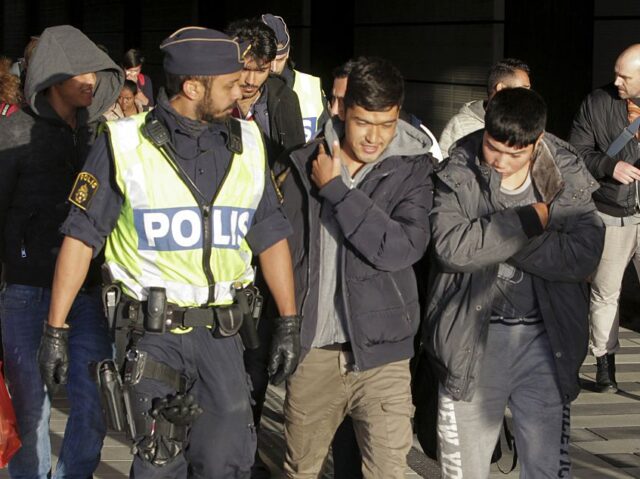More people will leave Sweden than arrive in 2024, a major turnaround for the country, which was once the most enthusiastic adopter of mass migration in Europe, and which experienced all the social unrest that seems to inevitably come with it.
The Swedish government has hailed its new anti-mass migration policies, as migrants start leaving the country in larger numbers, meaning it now has net emigration for the first time in over 50 years. The government’s Migration Minister, Maria Malmer Stenergard, has announced that “Sweden has stopped being an asylum immigration country” on the back of the latest figures.
This change is, in part, due to considerably fewer asylum seekers coming to Sweden this year and more migrants leaving Sweden. In a remarkable development unthinkable only a couple of years ago, a thousand more Iraqis left than arrived in 2023, over a thousand more Somalis left than arrived, and 500 more Syrians left than arrived.
The number of people leaving Sweden has increased by 60 per cent.
According to a Ministry of Justice statement based on Migration Agency data, Sweden will receive the lowest number of asylum seekers in 2024 of any year since 1997. Illustrating just how far these have fallen, there were 85,000 asylum applications in 2016, and just 5,600 so far in 2024, with new applications already running 27 per cent lower this year than in 2023, which itself had represented a record low year.
While these figures are relatively small and only represent baby steps towards the greater goal, which Minister Stenergard discussed, net migration being minus 5,700 in 2024 and being driven by former migrants departing is consequential for the country of just ten million people.
This change is not down to wider European trends, either, which makes Sweden’s achievement even more impressive. The government’s data pack makes clear that overall asylum seekers in the European Union remain very high, but “in Sweden, the decline continues from an already historically low level,” demonstrating Sweden has succeeded in the new government’s mission to make the country less attractive to mass migration.
Indeed, in 2015, Sweden took 13 per cent of all asylum seekers in the EU. In 2024, it is predicted to take just one percent.
Sweden got a new government in 2022, led by the Moderate Party—the national equivalent to Britain’s liberal centre-right globalist Conservative party—with coalition partners the socially conservative Christian Democrats, and the classically liberal Liberals party. The coalition is propped up by the right-populist Sweden Democrats, which, at times, were the lone voice on limiting migration during Sweden’s open borders years. Between their influence on the government and the much-changed Moderates, the Swedish state has taken a radically new course on immigration.
The Swedish government says that it has implemented “stricter asylum legislation” through combating what it calls the “shadow society”—the black market that allows illegal migrants to thrive—increasing returns and repatriations, cracking down on low-skill migration, revoking more residence permits for those who abuse Sweden’s hospitality, making chain migration harder, and requiring migrants to integrate.
Moderate Party migration minister Maria Malmer Stenergard hailed these policies as having been effective when she presented the latest immigration figures this week, boasting: “The government’s work yields results. The number of asylum applications is heading towards a historically low level, asylum-related residence permits continue to decrease and for the first time in 50 years, Sweden has net emigration.”
“Sweden has stopped being an asylum immigration country”, she reported.
Stenergard said lower levels of migrant arrivals are essential because persistently high arrivals make integration of newcomers into Swedish society difficult, given the tendency to form parallel communities. In other words, the Swedish government’s policy is to end multiculturalism and will require migrants to become culturally Swedish.
Indeed, Sviergesradio reports Stenergard told migrants this week: “If you are in Sweden to stay, you must learn the language, become self-sufficient and respect Swedish values”.
The Swedish upmarket newspaper Dagens Samhalle states the minister stopped short of outright saying that asylum migration had been bad but nevertheless said: “We have unfortunately seen that we have had a high asylum immigration in combination with a very poor integration. And there are many, not least those born abroad, who suffer from alienation. We must, for a long time, have greatly reduced immigration.”
Illustrating just what a journey the now-governing Moderates have been on, DS notes that next week is the 10th anniversary of former Moderate Prime Minister Fredrik Reinfeldt‘s infamous call to the Swedish people to “open their hearts” to the asylum seekers of the world.
These comments came during the 2014 general election campaign, when Reinfeldt told the public that if they voted for him, he would introduce no new programs for Swedish citizens because the cost of taking on so many asylum seekers would be immense. He said then: “I can already say that it will lead to large costs… They are so extensive that it will place further restrictions on what there is room for in public funding. Therefore, we promise next to nothing in this election campaign, there will be no room for that.”
Unsurprisingly, with such a bleak offering to the country, Reinfeldt lost the election, but Sweden’s left-wing Social Democrats under Stefan Löfven won instead. Löfven implemented everything Reinfeldt had spoken of and more during the Europe Migrant Crisis of 2015–2016, causing a demographic change more rapid and more pronounced than any other country in Europe.

COMMENTS
Please let us know if you're having issues with commenting.